Petr Pavel at the 177th Military Committee in Chiefs of Defence Session – NATO HQ, Brussels – 17 May 2017
Petr Pavel is a man who is not afraid to speak his mind, even if it sometimes makes his friends and allies nervous. Twice married and with three children, two boys by his first wife, Hana, and one by his current one, Eva Pavlová, who also holds the ranks of Lieutenant Colonel in the Czech army. She is an interesting woman: a professional soldier and mediator who has previously stated that she wants to be more active in her new role than her predecessor. Pavel is a polyglot who speaks not only Czech but also French, Russian and English, with some reports claiming he also speaks Chinese; he believes talking is more important than fighting and can solve more problems. He is a retired Czech army general who rose to become a military commander in NATO. Now he wants to return his country to the international stage following years of isolation. “Values like truth, dignity, respect, and modesty have won,” he said in a speech acknowledging his landslide victory. “I am ready to return these values not only to the Prague Castle (the Czech President’s official seat) but also to our republic through my service.” He is described as “non-religious”. His electoral success and his overwhelming majority will not have been welcomed as good news in Moscow. He has clearly stated that he is on Ukraine’s side in its war with Russia. He swiftly demonstrated his priorities as President immediately after his election by making his first phone calls to the Presidents of Ukraine and Taiwan.
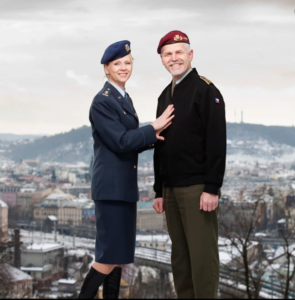
He is suspicious of China and has warned EU countries not to have any illusions about Beijing, saying that his country would no longer “behave like an ostrich” where Beijing is concerned. Its interests and the West’s don’t coincide. He has been quoted in the Financial Times as warning that: “China and its regime is not a friendly country at the moment, it is not compatible with Western democracies in their strategic goals and principles,” adding: “This is simply a fact we have to recognise.” Ignoring Beijing’s angry response, Pavel told the Financial Times that the Czech Republic stands to gain more from Taiwan that it will from China. His unexpected call to the Taiwanese leader, President Tsai Ing-wen (蔡英文), drew a scathing response from Beijing, which urged Prague to “change tack to avoid irreparable damage”. This is in line with the Moscow and Beijing playbook: do or say anything that stands in the way of our imperialist ambitions and the consequences will be your fault, not ours. Everyone must agree with them about their territorial ambitions. In Petr Pavel they may have met somebody determined to resist the propaganda. He wants Czechia to expand its cooperation with Taipei, which Beijing wants other countries to regard as part of China. Beijing punished Lithuania for taking a pro-Taipei stance by targeting its exports and was challenged for it by the EU at the World Trade Organisation. Now the speaker of the Czech lower house of Parliament, Marketa Pekarova Adamova, is set to visit Taipei, which will annoy Beijing even more.
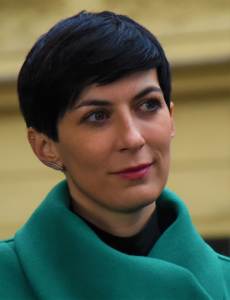
China doesn’t recognise Taiwan, but it regularly threatens it. Taiwan recently scrambled fighter jets, put its navy on alert and activated missile systems in response to nearby operations by 34 Chinese military aircraft and nine warships that are part Beijing’s strategy to unsettle and intimidate the self-governing island democracy. China instigated its large scale deployment as part of its preparations to deploy a blockade or other military action against Taiwan, which has led to increasing concern among military leaders, diplomats and elected officials in the United States, which is Taiwan’s most important ally.
What do we know about Pavel? Born in Planá in what was then Czechoslovakia, he joined both the army and the Communist Party after graduating from the Military High School of Jan Žižka from Trocnov in Opava, then he continued his studies at the Military Institute of Ground Forces in Vyškov, finishing in 1983. After that, he studied at the Antonín Zápotocký Military Academy of Technology in Brno between 1988 and1991 and then took part in study visits to the Staff College in Camberley, in the UK, the Royal College of Defence Studies and King‘s College London where he studied international relations. His courage as a military man has been proven several times, and he has won a number of awards for bravery, including France’s Croix de Guerre, a major and much-respected honour, earned when he was an elite paratrooper during the Bosnian war of 1993. He led a unit of Czech soldiers during the evacuation of Karin base, a French military base, to liberate a group of 53 French troops (plus the corpses of two more) who’d become besieged by the Serbs, with much of the local infrastructure destroyed. Pavel went to the isolated base with just 29 soldiers from the combined Czech and Slovak Battalion, aboard two OT-64 SKOT armed transports. They faced danger from many sides and were obliged to remove trees that had been brought down to block their way while under heavy mortar fire. Paris also awarded him the Legion d’Honneur medal for bravery in 2012 after “Demonstrating extraordinary courage by interposing himself between Serbian and Croat belligerents,” according to the citation, shown on the website of the French Embassy in Prague. His force also brought back the bodies of the two French soldiers killed in the fighting.
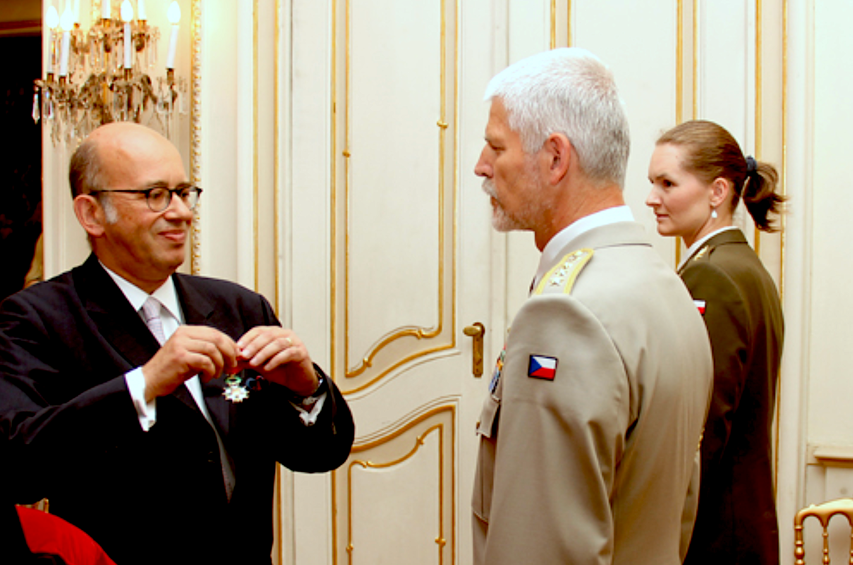
A retired Czech general who served with him in Croatia, Ales Opata, told the media: “We got into several tense situations and he always managed them with deliberation and calm.” Opata clearly admires Pavel’s unruffled approach to danger. “Once, Petr was off our carrier, talking to locals…it is never good when mortar shells start falling around you. With a calm head he finished what he was doing and came back.”
He went on to serve as Deputy Chief of the General Staff of the Czech Republic’s armed forces and was promoted to Chief of the General Staff in 2012. In that rôle he organised cooperation between the army and academics, as well as various fora on defence and security issues. While serving as a general (and a much-decorated general), he was nominated by the Cabinet of Bohuslav Sobotka, a Czech lawyer and politician, to chair the NATO Military Committee, being elected to the position in Vilnius in September 2014. He became the first senior officer from a former Warsaw Pact country to hold such a position.
| AN EXTRAORDINARY MAN FOR EXTRAORDINARY TIMES
In the election, his victory was overwhelming: He won 58% of the votes cast, which is the largest margin of victory since direct presidential elections were first held in 2013. It had been a tough campaign against Andrej Babiš, a wealthy populist, who had labelled Pavel “a warmonger” for backing the Czech government’s support for Ukraine, but it tallies with the attitude of the Czech government and reflects Pavel’s desire to clarify Czech attitudes towards Russia and China, as well as to establish more clearly Pavel’s own rather hawkish views of them both.
The turnout for the election was more than 70%, which is also a record. Pavel’s campaign slogan was “order and stability”: a clear break with the populism of previous presidents. The idea of “order and stability” clearly struck a chord with the Czech people and Pavel could be the ideal man to fulfil such a promise. The victory also suggests closer ties will be established with Czechia’s Visegrad Group (V4) neighbours.
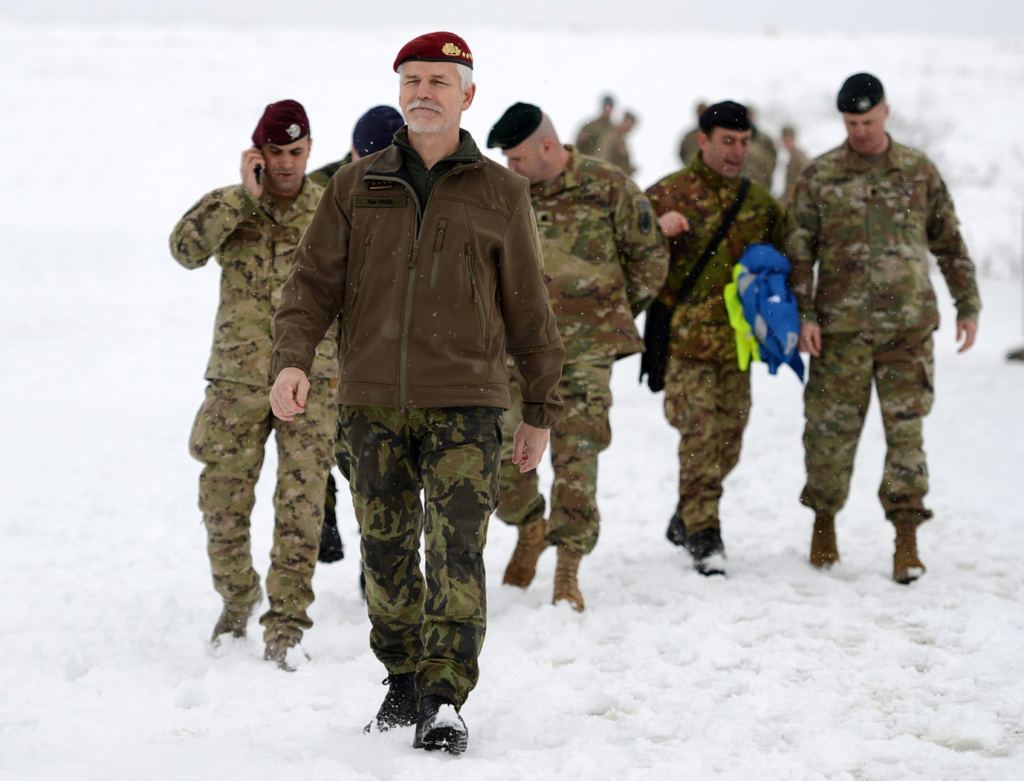
He ran his campaign for the presidency on a platform of closer cooperation with his country’s NATO allies, support for Ukraine and closer links with the EU. He had a reputation for trying to win people over by talking to them and he studied local languages to make it possible. He led the Czech army’s general staff from 2012, during his country’s involvement in Afghanistan, becoming chair of NATO’s military committee in 2015, a position he held until his retirement in 2018. He stood for election as an independent, not linked to any of the various political parties, but with the support of the centre-right cabinet. It was his leadership qualities, demonstrated in Croatia, that ultimately propelled him from being an officer in a Warsaw Pact army to his senior rôles in NATO. He is determined to see Czechia holding influential positions in NATO and in the European Union, and that sets him very much at odds with the man he’s replacing, Milos Zeman, who would have preferred closer links with China and Russia instead.
Pavel’s victory was popular with most Czechs, many of whom chanted “President! President!” as the results were announced. He called his win a victory for: “truth, dignity, respect and humility”. Despite a bitterly fought election campaign against the wealthy populist Andrej Babiš, he urged his supporters to take a peaceful approach to Babiš and his supporters: “We have different views on many things, but that doesn’t make us enemies,” he told the victory celebration, “We have to learn to communicate with each other.” At the event, Pavel received the congratulations of Zuzana Caputova, the President of Slovakia who had travelled to Prague to join in the celebrations. Pavel’s own appearance at the event did, at least, disprove one part of the fake eve-of-poll propaganda circulated by his rival, which claimed Pavel was dead. He’s very clearly not, but the fake news that he had died was circulated on a counterfeit version of his campaign website.

Babiš tried to capitalise on Pavel’s one- time membership of the Communist party, which Pavel himself admits but regrets. It’s a very dishonest bit of propagandising since Babiš had been an informer for the secret police back in the days of the Communist regime. Pavel’s campaign slogan was “order and stability”, which is what most Czech voters longed for after Miloš Zeman’s rule.
Pavel’s victory has been heartily welcomed by a former British Conservative MEP, Sajjad Karim: “Petr Pavel’s election is a brick knocked out of a wall that has been constructed by populists in East and West,” he told me. “We have all seen the harm caused to countries by populists and nationalists. By Czechs placing such confidence in a centre-right pro-democracy, albeit new, politician, Pavel’s victory now counts for much more than for the Czech Republic alone. His vast defence experience means he brings deep rooted expertise to the EU political table at a much-needed juncture.” Karim used to be an executive member of the European Movement UK as well as being Chair of Conservative European Forum for Trade, being that rare creature: a senior British Conservative politician opposed to Brexit. He now devotes his time to his day job as a director of Haider Global corporate consultancy but campaigned against Brexit when the issue filled the headlines. He wanted the UK to stay in the alliance.
Pavel attracted many younger voters with more liberal social beliefs, who were attracted by his stated support for such rights as gay marriage and abortion. A Czech president’s powers are limited but Pavel will be able to appoint a prime minister as well as members of the judiciary and the central bank. Few will miss the controversial figure he replaces, Miloš Zeman, whose sympathies over Ukraine lay with Russia. Jiri Pehe, a political analyst and director of the New York University in Prague, was quoted as saying: “Pavel will be a huge change – this cannot be over-estimated.” The fact of that change is becoming clearer, too. “We’ve had in the last ten years a president who was in many ways a disgrace for the Czech Republic.” Pehe explained how: “He was pro-Russian, by-passed the constitution and was rude and offensive.” Hopes for Pavel’s rule are clearly high: “Pavel will try his best to somehow represent the whole of society. He is someone who has respect for the rules of the game.”
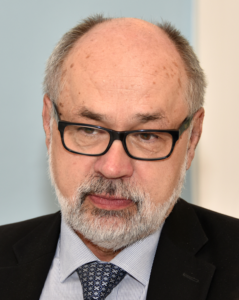
| BRINGING PEACE (AND HEAVY WEAPONS)
Pavel is ambitious for faster progress into and within the Western ranks, not only for Czechia but for others caught in Russia’s web. He told the BBC that Ukraine, for instance , would be “morally and practically ready” to join NATO as soon as the current conflict ends. After Russia’s menacing criticism of Western support for Ukraine, Pavel told the BBC: “There should be almost no limits” to what third countries can send to help in Ukraine’s defence. As far as he is concerned, delivering western fighter planes, such as America’s F-16s was “not taboo”, although he was unsure if they could be delivered in time to be useful to Kyiv. In the interview, Pavel said: “I am proud of my country being one of the first to provide Ukraine with significant military help.” Czechia was the first Western (or Western-sympathising) country to provide tanks and infantry fighting vehicles (they were Soviet-designed T-72s and BMP-1 amphibious vehicles) to Kyiv, part of a series of deliveries of heavy weapons that reportedly began as early as March 2022, according to the BBC. Other, larger Western countries are now following suit: Leopard 2 tanks from Germany, MI Abrams tanks from the US and Challenger tanks from the UK. “Probably very few people,” Pavel told the BBC, “could imagine that Western countries would be willing to provide Ukraine with modern main battle tanks or long-range artillery, or anti-aircraft systems.” Now, he said, it’s a reality. “But at the same time, we see it’s still not enough.” He would like to see Ukraine equipped with American F-16 fighter aircraft, which would give the Ukrainians the edge against Russia’s larger, faster Sukhoi aircraft. The F-16 may be smaller, lighter and not quite so fast but those who’ve flown them say they can outfly the Sukhoi. It seems unlikely, however, that President Joe Biden would agree to the transfer, despite Poland being prepared to lend some to Kyiv with which to tackle the Russians.

In some parts of Europe, especially Berlin, the provision of large-scale weapons of war worries politicians that it could be seen as “escalation”, especially with Russia warning that supplying weapons could drag the NATO countries involved into the conflict, even though the war (which Russia still calls, fairly pointlessly, “a special military operation”, whatever that is meant to mean) was instigated entirely by Russia as a simple land-grab. You will recall that Putin told his troops when it all started out that they’d be “welcomed” by the Ukrainians for driving out the Nazis, even though there were none there and in any case Ukraine’s leader is Jewish, so hardly likely to be pro-Nazi. Some Russian soldiers, then, were surprised to see elderly Ukrainian ladies throwing themselves in front of Russian vehicles to halt their advance. Pavel brushes aside such concerns over supplying weapons to Kyiv. “We have no alternative,” he told the BBC, “If we leave Ukraine without assistance they would most probably lose the war.” He added the warning: “If they lose, we all lose.”
Pavel retired from the army in 2018, becoming a lecturer and consultant, but he remained very conscious of the dangers posed by ambitious Russia and its voracious president. He was personally commended by NATO Secretary General Jens Stoltenberg, to whom Pavel was a senior advisor, for leading NATO;’s Military Committee with such distinction. This led to him being awarded Commander of the Legion of Merit for his work there. He certainly didn’t trust Moscow or Beijing. In April 2020 he launched a new initiative, Spolu Silnější, which means “Stronger Together”, in a bid to bring people closer to fight together against the COVID-19 pandemic in the Czech Republic, especially through crowd-funding financial help for volunteers helping out at hospitals and creating medical tools, as well as ensuring the country would be better-prepared to face future crises. He brought together a number of experts in various fields, such as Dana Drábová, from the State Office for Nuclear Safety, a top businessman, Martin Hausenblas, the President of the Czech Society for Emergency Medicine and Disaster Medicine, Jana Šíblová, as well as Jan Březina, former governor of the Olomouc region. Pavel even presented a copy of their report, the result of their work together, to Andrej Babiš, the man he would go on to defeat in the presidential election. Their views seldom if ever aligned.
| A CLOSER FUTURE?
What sort of future can Pavel offer to the Czech Republic and its allies? It rather depends on what is happening close to its borders.
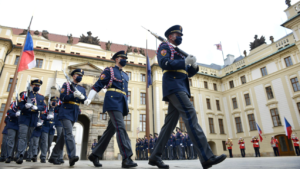
During his campaign to get elected, he described himself as “right of centre, with a strong social emphasis”. He also believes in a fairer distribution of his country’s wealth, with rich people paying higher taxes to help ease the burden on the rest of us, citing Scandinavian countries as his inspiration. He admitted to journalists that in the 2021 legislative election, he had voted for the centre-right Spolu alliance. The party (or rather group of parties that agree on some issues) is made up of the Civic Democratic Party, KDU-ČSL, and TOP 09 and ever since the 2021 Czech election it has governed the Czech Republic in a coalition with the Pirates and Mayors alliance. Don’t expect to see eye patches and cutlasses in evidence; it’s just a name.
Pavel has promised to bring “order” to the Czech Republic, which has been struggling with economic turmoil and high inflation, mainly caused by the war in Ukraine. Pavel stated on his campaign website that people in the Czech Republic are increasingly feeling “chaos, disorder and uncertainty”, and that the state has somehow ceased to function. It needs to change, he has said, and it also needs to play by the rules, which will be applied equally for everyone alike. He added that the country needs a general sweep. Russia, meanwhile, is living down to its reputation, allegedly involving itself in acts of torture and executions without any criminal proceedings first. There have also been documented cases of Russia firing rockets that carry PFM anti-personnel mines, also known as “butterfly mines” or “petal mines”. Local healthcare professionals have reported having to treat a large number of severe injuries inflicted by the mines, roughly half of them involving amputations of the foot and lower leg, consistent with injuries caused by PFM blast mines. Russia has repeatedly denied deploying such weapons.
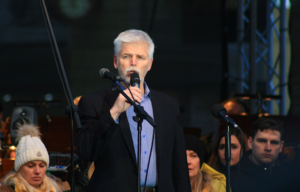
Pavel appears to fear a virtual race between Russia, keen to assure its victories, and Ukraine, keen to defend its people from slaughter, with the victory depending on the West supplying Kyiv with modern high-tech battlefield tanks that are capable of repelling Russian forces. What Ukrainian President Volodymyr Zelenskyy would really like is a squadron of F-16 fighters, but President Joe Biden has ruled out the idea, despite Pavel’s claim that there should be “no limit” to the supply of arms to Kyiv. Furthermore, French President Emmanuel Macron has stated that “nothing is excluded”. It was Chechia, however, that was first off the mark and Pavel would like its contribution to include F-16s, because Russia has at its disposal significant resources of men and materiel. Russia has warned that by supplying arms to Ukraine, Western countries are directly involving themselves in the conflict. Ukraine needs something, however, capable of punching holes in Russia’s armoured formations.
| FAMINE AND MISUNDERSTANDING
Tension between Russia and its near neighbour, Ukraine, is nothing new. Much of it stems from Stalin’s plans for collectivisation, which didn’t work. The targets imposed by Moscow led to food shortages, referred to in Ukraine as Holodomor, the great famine. Ukrainians have painted it as a deliberate attempt by Stalin to kill Ukrainian peasants, although the effects were equally devastating in parts of southern Russia and in Kazakhstan. Stalin certainly wanted as much grain as he could get and he accused the Ukrainians of “acting a famine”: pretending starvation. If it was pretence it was certainly convincing: it’s thought that upwards of five million people there died of hunger, although Russia denied it for decades. It was only admitted during perestroika, on the 70th anniversary of the foundation of the Ukrainian Soviet Republic that party secretary Volodymyr Scherbytsky even admitted that the famine had happened. Such a history is rarely, if ever, the beginning of a close and amicable relationship.
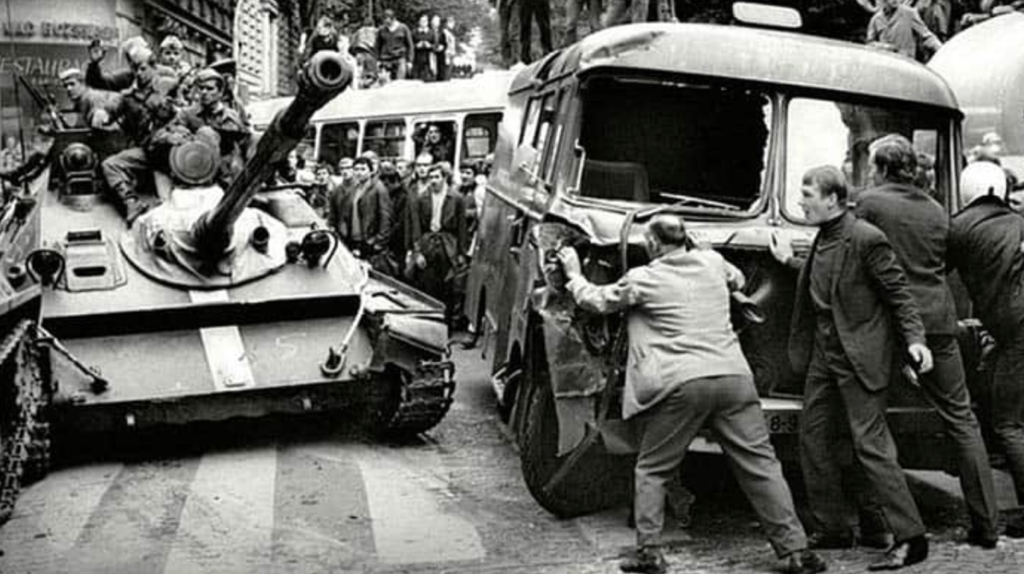
And, of course, in the late 1960s, Czechoslovakia, as it was known then, had been one of the most pro-socialist and pro-Soviet countries in the Soviet Bloc when it came under the control of a reformer, Alexander Dubček, who wanted to introduce “Socialism with a human face”. Russian leader Leonid Ilyich Brezhnev was determined to keep a firm grip on the Soviet “empire”, even though Czechoslovakia wasn’t trying to leave the bloc at the time. Brezhnev was determined to stop Dubček’s moves towards great press freedom, freedom of thought and expression, and the planned rehabilitation of the victims of Stalin’s political purges. On 20 August Soviet armed forces invaded the country, quickly taking over control, putting hard-line Communists back in positions of power and ending the brief period of freedom. Dubček was deposed the following April. On arms controls, Brezhnev succeeded, firstly in discussions over Berlin in 1971, then with an agreement on strategic arms limitation and the start of arms control talks between East and West through the SALT treaties. But you don’t overcome such deeply-felt bitterness overnight; it still continues. Brezhnev’s insistence that the members of the bloc must stay in it offended the Czechs in particular, and he continued to build up his weapons stock while talking of détente. The promising moves towards détente stalled in the late 1970s.
Given its history, it’s not surprising that the Czechs are very wary of Russia and its leaders, who seem to view aggression as a necessary attribute. But that was then and this is now. Petr Pavel has positioned himself as devoted to peace and prepared to take risks to secure it. He certainly wants to see Ukraine inside NATO and he is deeply suspicious of imperialists like Putin. “Our cities are being destroyed by Russian artillery and missiles,” he told his fellow European leaders, “But our future could be destroyed if we don’t support Ukraine to a successful end to this conflict.” He denies claims made by his opponent in the recent election, Andrej Babiš, that his known support for Ukraine would “close the door on diplomacy”. He still favours a peaceful settlement. “Once there is even the slightest chance of peace talks, let’s support it,” Pavel said. “But there are no signs of it from the Russian side. What needs to be said is this: the end of the war is entirely in Russian hands. It would take only one decision from President Putin to withdraw his forces from Ukraine and the war is over.” Of course, Pavel doesn’t underestimate Putin’s war-mongering stance. But neither should Putin under-estimate his newest political opponent. Pavel doesn’t back down.

